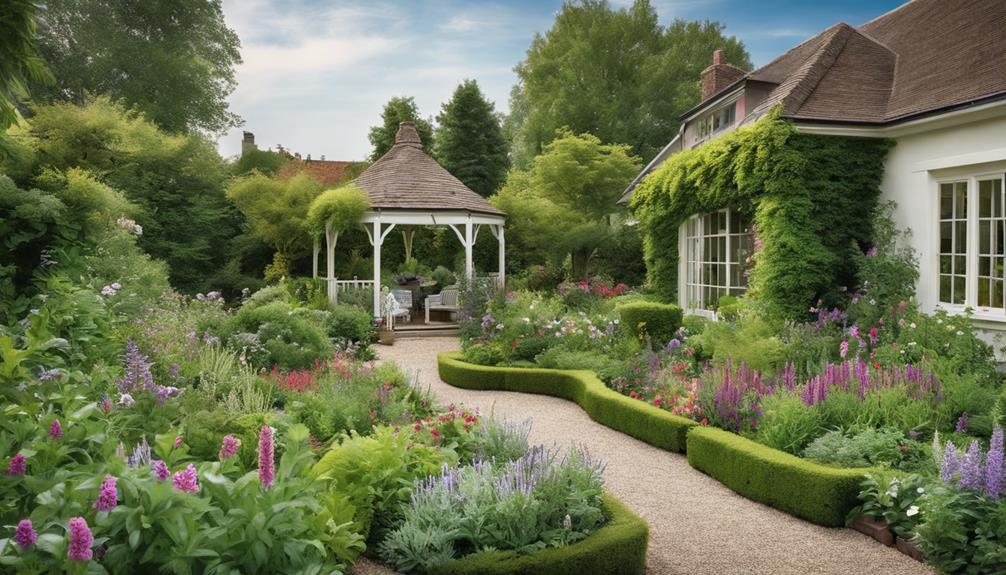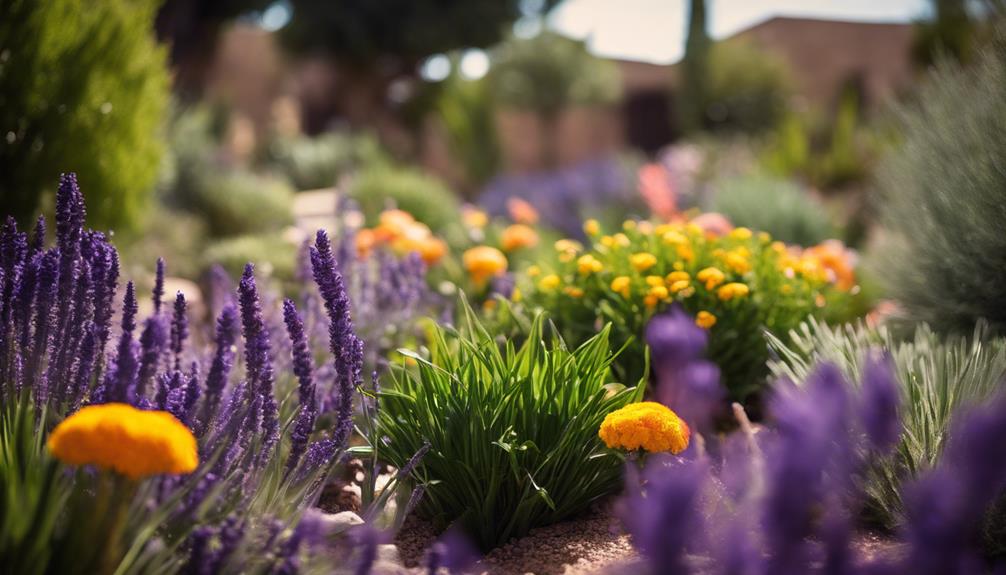Transform your St. George gardens with these mosquito repellent plants: Lavender – vibrant blooms and natural oils keep mosquitoes away. Plant in sunny, well-drained spots. Marigold – emits a strong scent that deters pests naturally. Adds beauty to your garden. Citronella Grass – effective against mosquitoes, with a fresh lemon scent. Ideal for warm climates. Catmint – a powerful repellent, ten times better than DEET. Works from summer to fall. Rosemary – woody scent repels mosquitoes and pests. Versatile and long-lasting. Enhance your garden while keeping bugs at bay with these pest-repelling plants in your St. George landscapes.
Key Takeaways
- Consider planting Citronella Grass for natural mosquito repellent in St. George’s warm climate.
- Opt for Catmint, ten times more effective than DEET, for long-lasting mosquito protection in zones 3-8.
- Choose Rosemary for its woody scent that repels mosquitoes and thrives in hot, dry climates.
- Include Bee Balm to attract pollinators, add vibrant colors, and act as a natural barrier against mosquitoes.
- Plant Mint for its pungent aroma that repels mosquitoes, flies, and ants in zones 3-8.
Lavender

Lavender, known for its delightful fragrance and vibrant purple blooms, serves as a natural mosquito repellent due to the essential oils it emits, disrupting the insects’ ability to locate prey. These essential oils not only add to its charm but also act as an effective deterrent against pesky mosquitoes.
Thriving in full sun and well-drained soil, lavender is a drought-resistant plant that flourishes in warmer climates, making it a perfect addition to your garden. Its mosquito-repelling properties make it a practical and aesthetically pleasing choice for those seeking to create a peaceful outdoor space free from unwanted insect intruders.
Additionally, lavender is a perennial plant that can be enjoyed in zones 5-11, showcasing its beautiful purple flowers year after year. Beyond its mosquito-repellent qualities, lavender also offers decorative, medicinal, and culinary benefits, making it a versatile and valuable plant for any garden or landscape.
Marigold
With its potent aroma that naturally repels mosquitoes, marigold is a versatile and beneficial addition to any garden or landscape. These easy-to-grow annual plants not only add a pop of color to borders and vegetable gardens but also serve as a natural deterrent for mosquitoes. Marigolds emit a smell that effectively keeps away mosquitoes, making them a valuable addition to your outdoor space.
Apart from their mosquito-repelling properties, marigolds are known to keep away other pests such as aphids and thrips, benefiting the overall health of your garden. Their vibrant blooms from late spring until frost not only add beauty but also contribute to creating a more pleasant outdoor environment. By planting marigolds, you can reduce the need for chemical repellents in your garden, promoting a more natural and eco-friendly approach to pest control.
Consider incorporating marigolds into your garden to enjoy their dual benefits of aesthetics and mosquito deterrence.
Citronella Grass

Citronella Grass, a commonly used natural ingredient in mosquito repellents, thrives best in warm climates and is ideal for planting as a border or ground cover in gardens. Here are some essential points to ponder about this natural insect repellent:
- Versatile Repellent: Citronella Grass is a natural insect repellent that works effectively to keep mosquitoes at bay in outdoor spaces.
- Growing Conditions: This ornamental plant flourishes in warm climates and is typically cultivated as an annual in zones 9-11, making it suitable for St. George gardens.
- Effective Living Plant: The living Citronella Grass plant is more potent in repelling pests than processed citronella products, ensuring a natural and efficient way to deter mosquitoes.
- Lemon Scent: Its strong lemon fragrance not only adds a pleasant aroma to your garden but also acts as a natural deterrent against mosquitoes, enhancing your outdoor experience.
Catmint
Enhance your garden’s mosquito-repelling capabilities with the powerful and easy-to-care-for Catmint plant. Catmint, a perennial plant that’s ten times more effective at repelling mosquitoes than DEET, blooms from early summer to fall, providing long-lasting protection.
This versatile plant, suitable for zones 3-8, guarantees you can enjoy its benefits regardless of your climate. When you crush the leaves of Catmint, fragrant oils are released, effectively deterring mosquitoes from your outdoor space.
Rosemary

Rosemary not only emits a woody scent that repels mosquitoes but also keeps cabbage moths and carrot flies at bay.
This perennial herb thrives in hot, dry climates, making it perfect for zones 7-10.
With the added benefit of being a versatile culinary herb, rosemary can enhance your dishes while naturally repelling pests in your garden.
Rosemary Benefits
With its woody aroma that naturally deters mosquitoes and other pests, rosemary stands out as a versatile herb for both gardening and culinary purposes. Here are some benefits of incorporating rosemary into your St. George garden:
- Rosemary emits a woody scent that repels mosquitoes, cabbage moths, and carrot flies.
- Thriving in hot and dry climates, rosemary is ideal for St. George gardens.
- This herb can be pruned into different shapes and is suitable for containers.
- As a perennial herb suited for zones 7-10, rosemary provides long-lasting mosquito-repelling properties while also enhancing your cooking with its seasoning capabilities.
Growing Tips
For peak growth and pest-repelling effectiveness, consider implementing these practical tips when cultivating rosemary in your garden. Rosemary, a perennial herb suitable for zones 7-10, thrives in St. George’s warm climate. Here are some growing tips to help you cultivate healthy and mosquito-repelling rosemary:
| Growing Tips for Rosemary | ||
|---|---|---|
| 1. Sunlight | Watering | Soil |
| Requires full sun | Allow soil to dry out | Well-draining soil |
| for at least 6 hours | between waterings | with good drainage |
| daily. | to prevent root rot. |
Basil
Basil effectively repels flies and mosquitoes due to its pungent nature and high content of essential oils. Here are some key points about basil as a pest-repelling plant:
- Growing Conditions: Basil thrives in damp soil with good drainage and plenty of sunlight, making it an ideal addition to your garden or landscape.
- Annual Herb: Being an annual herb, basil is suitable for zones 10-11, providing a seasonal but effective solution for pest control.
- Companion Planting: It can be planted alone or alongside other flowers to enhance its pest-repelling benefits, creating a natural barrier against unwanted insects.
- Potent Natural Repellent: The essential oils present in basil not only give it its distinctive aroma but also make it a powerful natural option for keeping pests like flies and mosquitoes at bay.
Scented Geranium

Scented geraniums, like basil, are prized for their natural pest-repelling properties and early blooming characteristics, making them an excellent choice for enhancing your garden’s defenses against mosquitoes and other unwanted insects. These ornamental plants emit a delightful lemon-scented aroma that effectively deters mosquitoes and pests in St. George gardens. Their fast growth and low maintenance make scented geraniums a popular option for natural insect control in warm climates. Additionally, their versatility in repelling various pests adds to their value in St. George landscapes.
Not only do scented geraniums serve a functional purpose, but they also contribute to the aesthetic appeal of gardens with their beautiful blooms. By planting scented geraniums, you can create a fragrant and visually appealing space while keeping mosquitoes at bay. Consider adding these versatile plants to your garden to enjoy both their mosquito-repelling qualities and their charming presence in St. George gardens.
Bee Balm
Enhance your garden’s natural defenses against mosquitoes by incorporating Bee Balm, a colorful perennial plant that attracts beneficial insects while effectively repelling unwanted pests. Here’s why Bee Balm is a fantastic addition to your St. George garden:
- Beneficial Insects Attraction: Bee Balm not only repels mosquitoes but also attracts bees and butterflies, promoting a healthy ecosystem in your garden.
- Natural Mosquito Deterrent: Crushing the leaves of Bee Balm releases fragrant oils that naturally deter mosquitoes, offering you a chemical-free solution.
- Adaptability: Suited for zones 4-8, Bee Balm blooms from mid to late summer, adding vibrant colors and delightful scents to your landscape.
- Dual Benefits: Besides its ornamental value, Bee Balm serves a medicinal purpose and acts as a natural barrier against pests like mosquitoes, making it a versatile plant to have in your garden.
Mint

Incorporate mint into your garden or landscape for a versatile and effective mosquito repellent solution that thrives in a wide range of climates. Mint, a perennial herb suitable for zones 3-8, emits a pungent aroma that effectively repels mosquitoes, flies, and ants in gardens and landscapes.
To guarantee its growth, mint requires damp soil, good drainage, and plenty of sun. Its lemon-scented leaves not only serve as a natural pest control solution but also offer the option of making soothing tea. Whether planted directly in the ground or in pots, mint is a low-maintenance plant that adds both functionality and aesthetic appeal to your outdoor space.
Consider placing mint strategically around seating areas or entry points to maximize its mosquito control benefits. By incorporating mint into your garden, you can enjoy its pleasant fragrance while keeping pesky insects at bay, making it a valuable addition to your outdoor oasis.
Allium
Planting allium in your garden can effectively repel mosquitoes due to its strong fragrance disliked by these pests. Here are some reasons why allium is a great choice for natural mosquito repellent and pest control in your outdoor space:
- Fragrance: Allium plants release a strong scent that mosquitoes find unpleasant, acting as a natural deterrent.
- Aesthetics: With globe-shaped flowers on slender stems, alliums not only keep mosquitoes at bay but also enhance the beauty of your garden.
- Versatility: Alliums, including garlic and onions, offer additional pest control benefits beyond repelling mosquitoes.
- Barrier: By planting alliums, you can create a natural barrier that helps prevent mosquitoes from entering your garden, providing you with a peaceful outdoor environment.
Incorporating alliums into your garden not only adds visual appeal but also serves as a practical way to control pests like mosquitoes naturally.
Frequently Asked Questions
What Is the Best Outdoor Plant to Keep Mosquitoes Away?
To keep mosquitoes away, try using citronella candles, natural insecticides, DIY mosquito traps, and essential oil blends. These solutions are effective at repelling mosquitoes and creating a more enjoyable outdoor space for you to enjoy.
What Is the Most Effective Plant Based Mosquito Repellent?
For the most effective plant-based mosquito repellent, turn to natural alternatives like aromatic herbs. Essential oils from plants like citronella grass, catnip, lemon-scented geraniums, Mexican American oregano, and rosemary offer sustainable solutions for repelling mosquitoes.
What Plants Are Mosquito Repellent for Hgtv?
For natural deterrents in your landscape design, aromatic herbs like marigolds, citronella grass, catmint, lavender, and rosemary are effective for pest control. Incorporate these plants to keep mosquitoes away and enhance your outdoor space.
How Do I Make My Garden Mosquito Free?
To make your garden mosquito-free, try natural solutions like DIY repellents using essential oils and strategic plant combinations. Place herbs like basil near sitting areas. Wear long sleeves and use other protective measures.




